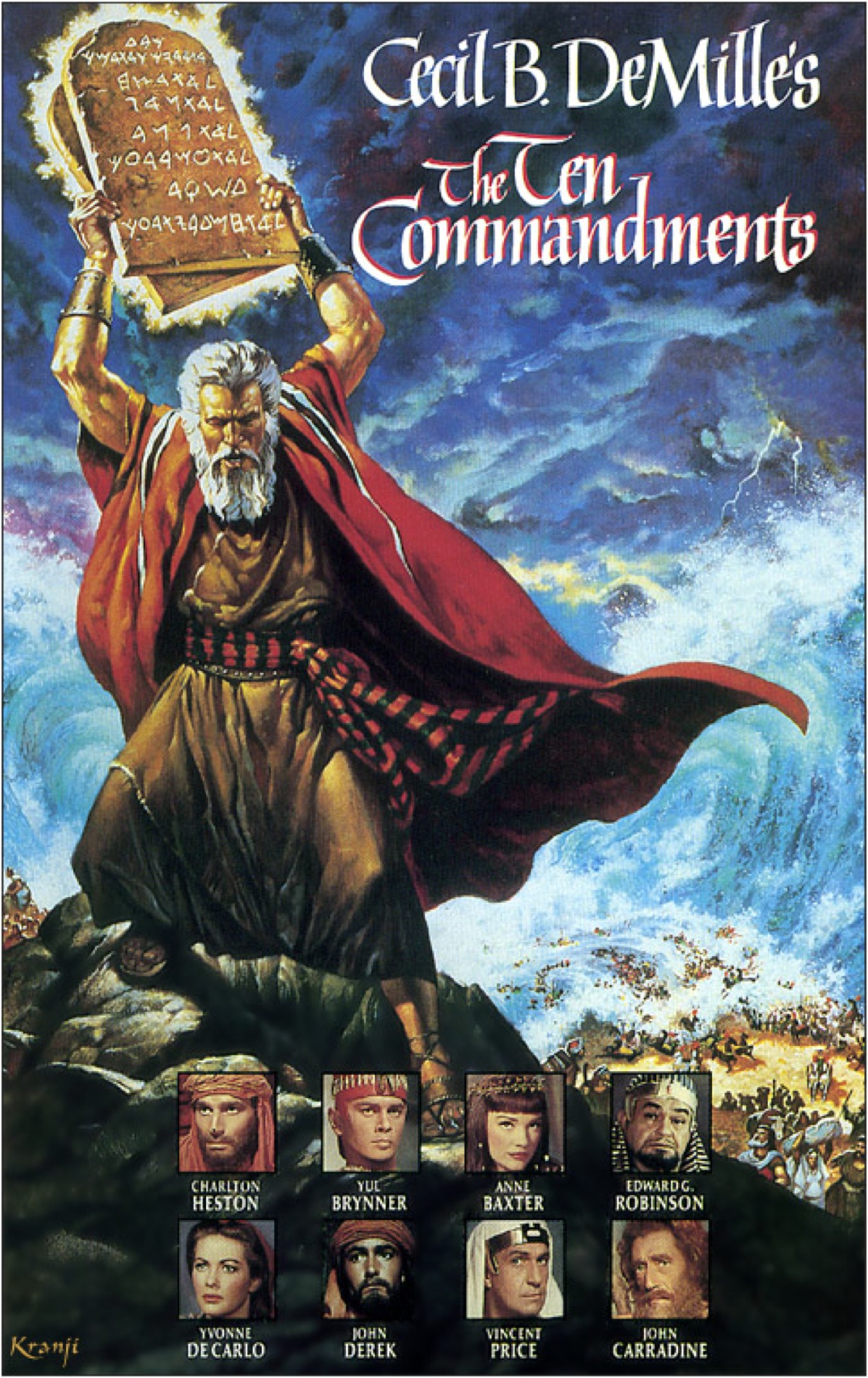SUMMARY
"The Ten Commandments" is a retelling of the story of Moses found Exodus. This film, beginning with the abandoning of a slave child in order to save his life, follows that child (Moses) as he grows to adulthood in the court of the dictator Pharaoh and discovers his humble origins, setting him on a path which alienates him from those who once called him son, brother, and lover yet draws him nearer to God freedom for those he once called slaves.
MY THOUGHTS
“The Ten Commandments” is a film which comes preloaded, for me, with many feeling which have nothing to do with it’s quality. On the one hand I want to divorce myself from these feelings as I review it but on the other, I want to acknowledge them because many of these feelings are a result of the tremendous impact this film has had on our culture and the medium of film.
I remember watching this film as a child on Easter Sundays in the little living room of my Grandma Quick. This film aired on TV every year, so in some ways it doesn’t feel like Easter to me unless I have kielbasa, ham, potatoes, and Charlton Heston ('“Ben-Hur”, “The Agony and The Ecstasy”). It’s accidental that this movie holds such nostalgia for me but like many accidents the causes of it are easy to see.
This last of Cecille B DeMille’s features was also his grandest spectacle. It still ranks as the 6th highest grossing film (adjusted for inflation) of all time. It was nominated for 7 Oscars and won the Academy Award for Best Special Effects (effects we might laugh at today were cutting edge in their day) and was such a huge production that while it went over budget by over 50% of its original budget, you can really see the reasons see why.
In an age where vistas and extras alike are rendered by computers there is a magnificence about seeing hundreds of real people stretching into the background of a scene. The number of animals, chariots, and buildings which are really there is staggering.
A particular favorite of mine is the costuming. The royal costumes feel rich and laden with excess while the slaves feel like their clothes are literally stuck to their bodies by the mud they tread. One particular skull cap worn by Moses is seared into my brain from an early age as what I imaged must be the most rank and foul article of clothing ever worn. By contrast, the the armor worn by Rameses, is brilliant. As a child, my definition of wicked awesome battle gear was Boba Fett and this…
I know that my emotional reaction to Rameses is only half the armor, probably less even. It is the performance by Brynner that sells this character. Having just seen this film just yesterday on the big screen, I can attest that his performance, and Heston’s as well, hold up remarkably well.
Of course our standards of acting are dramatically different today than they were in the ‘50s but this film is a grand film, an epic featuring epic characters in need of epic performances. I don’t even really know if it is their acting that is good or if it is just their presence but Heston and Brynner have a power on screen that is so palpable that they can actually deliver lines like “So let it be written, so let it be done,” and “Thus sayeth the Lord, let my people go,” and it feels like the sort of thing they would probably be saying even if cameras weren’t rolling. It just feels natural coming out of their mouths.
But this is where “The Ten Commandments,” begins to struggle, in my opinion. While the leads are able to pull off these lines, many actors and actresses with less presence struggle to deliver these epic lines in a way that doesn’t elicit laughter. Especially the women. There are times in this film I want to hide my face because I am so embarrassed for their performances. I don’t necessarily think this is the fault of the actresses. Some but not all. The rest of the fault I find for these performances is in the writing.
How are even talented female actors supposed to pull off scenes wherein seven women are required to fawn all over a man they have never met and utter lines like, “What kind of man is he? Who cares he’s man.” Many of these laughable moments are not the fault of the performer but the writer.
The same can be said for the noticeable amount of monologue spoken to seemingly no one other than the unseen audience. At time these lines give a sense of God, being spoken to and called out for, but at other times it feels more like exposition that belongs on a title card in a silent film rather than in the mouths of a featured extra.
Most of my issues with “The Ten Commandments” are simply products of the day in which it was made and you can hardly fault a film too much for that. I honestly think most people could handle much of what I have disliked about this movie and would enjoy the films message. While overtly religious and unusual by today’s standards in its brazenness, it’s message is a remarkably contemporary one, of the rights of all men to freedom from oppression and slavery, whatever their race.
The one thing that will disqualify this film from modern audiences, unfortunately, is it’s length. I saw the film in theaters and adding in the overture and intermission it ends up being almost 4 hours long. That is simply too much to ask most modern audiences to sit through when there are films like “Prince of Egypt (1998),” which portray many of the same events in a more modern style and with much more brevity.
VERDICT
Hopefully it doesn’t sound like I’m ragging on this movie. I like it quite a lot. I am simply aware of how out of step it is with most modern audiences desires in a film, but if you can find it in yourself to bear with the elements of it that are a bit old school (I prefer the word classic) I think you will find it to be as impressive a film as the multitudes who have enjoyed it before you.
Review Written By:






